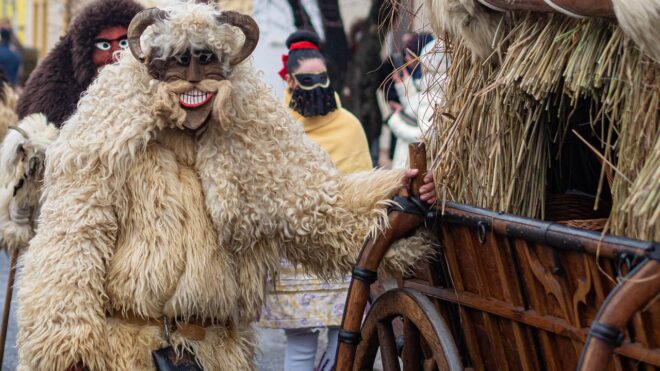Farsang (pronounced “farshang”) is the Hungarian equivalent of the Carnival season, with some specific alterations. Farsang covers the entire period between the twelfth day of Christmas and Shrove Tuesday, and it is a time for merrymaking and courtship.
When exactly is Farsang in Hungary?
The length of the Farsang period is different each year. It always starts on the 12th day of Christmas, also known as the day of Epiphany, or the day when the Magi, the 3 wise men from the East arrive to see the baby Jesus. The end of Farsang, Shrove Tuesday, however, is different each year. It is defined by the following day, Ash Wednesday, which is 40 days before Easter Monday – and Easter is defined by the first full moon following the spring equinox.
In 2023, Farsang is between 6 January and 21 February.
The most important part of Farsang is the “tail of Farsang”, meaning the last 3 days before the start of Lent. This way it includes Sunday, Monday, and Shrove Tuesday, which fall on 19, 20, and 21 February in 2023. Neither of these days are bank holidays, though.
Farsang traditions in Hungary
Farsang is traditionally for merrymaking and courting, and even weddings. Various folk traditions are related to making winter go away and spring come sooner. Dressing up as scary things and making noise is prevalent, as that is well known to ward off evil (and winter is kind of evil as it can kill you with cold and starvation).
Internationally, one of the best-known Farsang-related traditions in Hungary is the “Busójárás” at the tail of Farsang, when people in fur coats and heavy wooden masks have a parade through the city making noise, lighting a bonfire at night. This tradition, however, is particular only to the region of Mohács, in the Southern part of Hungary, West of the Danube.
Another tradition at the tail of Farsang includes the burning of the “Kisze” doll, a human-sized doll made of straw that is paraded through the village and then burnt at a bonfire, getting rid of all things evil with it. In some regions the doll is buried in the snow or thrown in the river.
In cities, you will find costume or fancy-dress parties all over the place, especially at the tail of Farsang. Community centers will certainly have family days with music, arts-and-crafts-workshops, and face painting as well as costume parties. Already kindergartens have fancy-dress parties, and from primary school up, there are even contests where the best or most creative costumes may win small prizes.
Farsang and Lent
While Farsang is dedicated to having fun together, it is directly followed by Lent, a 40-day season for restraint and meditation. During Lent, you are not supposed to eat meat, or even cheese or eggs. This is supposed to clean your body and soul, and prepare you for the death and resurrection of Jesus Christ at Easter. As a result, the tail of Farsang is an especially cheerful season, as it is the last opportunity to have fun until Easter.
There is a special day emphasizing this contrast between Farsang and Lent: Fat Thursday. This is supposed to be the last Thursday before Lent, dedicated to eating together, especially rich foods and sweets.
In Hungary, however, Fat Thursday is in some regions considered the first Thursday after Lent has already started, so the first day after Ash Wednesday. This happens to let people eat the leftovers from the Farsang parties. This day also used to be popularized as a special event by Hungarian Tourism Inc., and participating restaurants were encouraged to offer significant discounts on their menus. The last such event took place in 2016, however, and over the last few years pandemic related restrictions interfered with it anyway.
Celebrate Farsang like a Hungarian
Are you in Hungary in the Farsang period? Then try and check out Farsang-related events in your area. You can even go for a trip to visit a festival in the countryside, or the Busójárás in Mohács. This is a great opportunity for getting more familiar with Hungarian culture.
Do you have any Hungarian ancestors? Then celebrating Farsang might be an especially fun way to learn more about the traditions of your ancestors. Moreover, you might even qualify for Hungarian citizenship based on your heritage. In that case, we would be happy to help you on your journey. We have also built a free, online survey with which you can test if you have everything you need for the application.
Did you like this article? Follow us on Facebook to learn more about Hungary.



